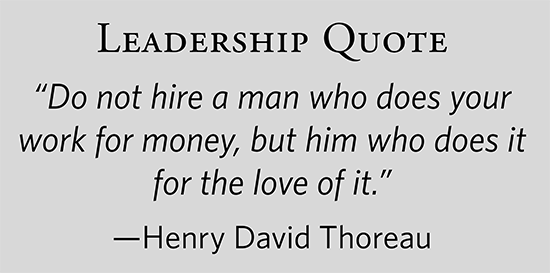
October-November 2020
Around the Corner
------------------
|





The column "Leadership Whiteboard" provides a short visual leadership coaching moment. It introduces and explains a new sketch in each issue, provides leadership coaching for further development, and shares a leadership quote and recommended book.
How to Hire
Hiring great people occurs when you combine science and discernment, covered with 100% prayer. The typical hiring process follows the sequence of reading a resume and conducting a phone interview, followed by a face-to-face interaction. Remember, a resume is the best “paper view” of one’s self. The traditional means of hiring is almost completely subjective. This candidate positions his or her experience in the best possible light, and then you weigh the phone and in-person interview based on personality.
Science helps alleviate the misalignment of a bad hire 18-24 months later. For example, churches hire pastors based upon preaching their best sermon, “talking the talk” for an hour or two and being super-likable. Is it coincidental that many pastors change churches every two years? How can science help?

First, before ever seeking names, determine what the position needs and list complementary talents, experience, and characteristics. This list forms a scorable matrix to rank candidates. Do the same for the face-to-face interview. Rather than base evaluations on conversational skills, examine tasks, philosophies, leadership styles, and methodology you expect after the hire.
Such appraisals take time and creativity. Prior to any phone interview, create a list of questions candidates will answer in writing, so you can score and compare the responses to other candidates. Personality assessments also provide incredible insights. Talk to those who provided a reference. Science helps turn subjectivity into objectivity.
Science also informs discernment. Hiring requires due diligence to ensure the correct match. Let the questionnaires, scoring, and list of the position’s needs inform who moves to the next stage. Very few times will someone meet all your dream needs or necessary experience. You must hire someone who has capacity and potential, knowing past performance predicts future effectiveness.
Discernment steps in where science stops. The one hiring knows the complete needs: experience, capability, capacity, potential, character, and chemistry. Sometimes, the most capable person may be toxic in your environment, and you must evaluate chemistry with interpersonal and
directional relationships. Discernment clarifies leaders among a capable field.
Science and discernment are nothing without prayerful dependence upon God. Pray through the discovery process seeking spiritual and practical discernment. See what the Holy Spirit does with the answers provided by the candidate or candidates. When you listen to the crowd instead of God, you will most likely be re-hiring for the same position all too soon. The art of hiring includes science, discernment, and prayerful deliberation.
About the Columnist: Ron Hunter Jr., Ph.D., is CEO of Randall House
Publications.

|
|

